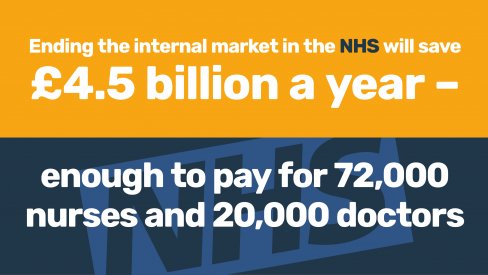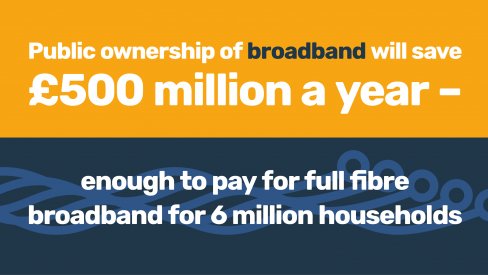10 reasons why privatisation is bad for you
You pay more, both as a taxpayer and directly when public services are privatised. Since privatisation, your water bills, energy bills and rail and bus fares have risen far above inflation.
The quality of your services is also damaged by privatisation. Terrible public transport. Raw sewage in our rivers and seas. Worse care in our NHS because of outsourcing. There are many examples of privatisation failing.
Here are 10 reasons why privatisation has failed – and will always fail
Why did it all go so wrong?
1. You don't have a choice - public services are natural monopolies
Public services and infrastructure provide us with the essentials that we all need to live a good life. Things like water, energy, public transport, the Royal Mail, care, council services, education and the NHS.
Privatisation was introduced because of a belief in free markets and consumer choice. But public services tend to be what economists call ‘natural monopolies’, or services where competition doesn’t really make sense. For example, when you take the train, you don’t really have a choice about which one to use. There is no real market.
Private monopolies are the worst of all worlds. You don’t have consumer power because you can’t go elsewhere. But you don’t have power as a citizen either. Contracts to deliver public services are agreed between private companies and government behind closed doors. There is very little transparency or public scrutiny.
We need public ownership with accountability mechanisms that give us a say.
Profit as the priority makes your services worse:
2. Waste
Money from your bills and taxes should go into improving public services. But with privatisation, dividends must be paid to shareholders. Interest rates are higher for private companies than they are for government. (Plus, there are the extra costs of creating and regulating an artificial market.)
For example, the privatised English water companies have spent £72 billion on shareholder dividends since privatisation – money that could have been invested in infrastructure to stop leaks and tackle sewage spills. These companies have also built up a debt mountain of £54 billion which we are all paying for.
If you compare English water with publicly owned Scottish water you can see what this means in practice. Scottish Water invests 35% more in infrastructure – if we in England had invested at that rate an extra £28 billion would have been invested.
Our polling found that the top reason why people want public ownership is that they want profits to be reinvested into improving services instead of going to shareholders.
3. Cutting corners
The drive to maximise profit comes into conflict with the need to spend time caring, or spend money to meet people's needs.
An Oxford University study found that outsourcing of NHS services has led to an extra 557 deaths. Cutting corners is likely to be one of the main reasons why this is the case. Another Oxford University study found that when care for vulnerable children is outsourced, more of them are sent across the country away from their support networks and families - because it's cheaper for the companies.
4. Cherry picking
Private companies cherry pick the profitable bits of a service and leave the rest.
For example, bus companies will choose to run buses on profitable routes but ignore rural communities, unless government steps in with a subsidy. It's more efficient to run buses as a whole network so that money from busy routes can subsidise quieter ones. Public ownership makes it easier to provide a good service for everyone.
When probation services were privatised for a few years, private companies dealt with the easy cases while the public sector was left with the trickier ones.
Creating an artificial ‘market’ causes problems:
5. Fragmentation
When lots of private companies are involved in delivering a public service, this can create a complicated, fragmented system where it’s not always clear who’s doing what. For example, on our railway, different organisations are responsible for managing the track and stations, running trains and leasing trains. This is inefficient and wasteful.
More generally, the public sector works well when it can be cooperative and integrated, and when information can be shared. For example, hospitals may need to communicate with GPs and carers to look after an older person who needs support at home. Adding private companies into the mix makes this coordination harder.
6. Wrong incentives
When private companies run public services, they may not have an incentive to help tackle problems. For example, companies running private prisons will get paid more money if more people are locked up.
These mixed motivations may compromise the professional standards of the staff involved in making decisions. In the US, doctors perform thousands of unnecessary operations for profit.
7. Inadequate regulation
The regulators (Ofwat, Ofgem, etc) are supposed to be standing up for the interests of us, the public. However, they have failed for the past 40 years.
Often there’s a revolving door between people working for the regulator and people working for the companies they are regulating. For example, Cathryn Ross who was previously the CEO at Ofwat, the water regulator, now works for privatised Thames Water.
Privatisation damages the public sector:
8. Lack of flexibility
Councils and government departments are responsible for meeting the needs of the public – but privatisation means less flexibility for changing circumstances. If an outsourcing contract with a private company needs changing, government must pay more to make changes or improvements, add in extras or to opt out.
And selling off public assets (like student loans) or public land (like school playing fields) means we the public have fewer options and resources for delivering the services we’ll need in the future.
9. Loss of capacity
Handing over control to private companies weakens the public sector, reducing the skills and people available to provide high quality public services.
Mariana Mazzucato and Rosie Collington write in their book 'The Big Con' that consultancies in particular have hollowed out state capacity. 'The more governments and businesses outsource,' they write, 'the less they know how to do'.
And when private companies fail to deliver, the government (local or national) often doesn't have the time or expertise to force them to keep their promises.
10. Risk of bailouts
Public services are vital, they're not optional extras, and so they are often too big and too important to fail. This means the government stands ready to rescue private companies in their hour of need - we saw this for example with outsourcing firm Carillion, the East Coast railway line, energy retailer Bulb and Thames Water.
When privatisation goes wrong, we the public have to pick up the pieces. We take the risk while shareholders walk away with the profit.
Get involved
Join the campaign to bring your public services into public ownership, sign up to our mailing list and follow us on Facebook, Twitter and Instagram.







